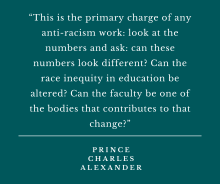Last summer, in response to the murder of George Floyd by a Minneapolis police officer and the protests against police brutality that took place across the country soon after, the Berklee Faculty Union formed a new Anti-Racism Committee (ARC). Many other organizations, including AFT Massachusetts locals, have formed similar groups to more actively participate in the Black Lives Matter movement and to organize against racism in our institutions.
For Prince Charles Alexander, a Professor at Berklee who teaches advanced production and mixing and serves as Chair of the Berklee Faculty Union’s ARC, this moment is reminiscent of the Civil Rights Movement of the 50s and 60s.

The Berklee Faculty Union’s Anti-Racism Committee first met in early July 2020, and is led by a four-member committee: Professor of Music Production and Engineering Prince Charles Alexander, Assistant Professor of Harmony Vanessa Morris, Professor of Composition Marti Epstein, and Assistant Professor of Theater Paul Masters.
For groups considering forming their own Anti-Racism Committee, Prince Charles emphasizes the importance of combining historical perspective with new energy, examining existing disparities, and providing opportunities for substantive conversations about race.
“These conversations have been going on for decades, if not hundreds of years. Some say the time for conversation is over, but it’s important to honor it,” he says. “Even before we do anything, we need to inform ourselves of the current inequities. That can point to where there are issues that need to be addressed.”
As an example, Prince Charles mentions serving on the Boston Public Schools’ Advanced Work Class Committee (AWC), as he has two children enrolled in BPS schools. In that committee, he’s examined the disparities in our public education system by looking at the racial makeup of various schools, and how that corresponds to their funding levels and graduation rates.
“This is the primary charge of any anti-racism work: look at the numbers and ask: can these numbers look different?” he says. “Can the race inequity in education be altered? Can the faculty be one of the bodies that contributes to that change?”
The ARC at Berklee has worked to open up a dialogue on a campus that remains predominantly white.
“Doing this work through the faculty union can be helpful in terms of training, and in resolving issues that may come up between faculty members and students,” says Prince Charles. “We can promote restorative justice practices, and help ensure that students and faculty members feel safe and able to express themselves in the classroom. As an Anti-Racism Committee, we’ve been able to wade into a broader set of issues than the union traditionally has, but also act as an additional voice for the union.”
The Anti-Racism Committee is already having an impact, with the appointment of a Black BFU Councilor at Large in September and partnerships with student groups formed to bring a high-profile speaker to campus. The Committee was involved in a project by the College to rename buildings on campus after African American musicians. But Prince Charles knows that there are still frank conversations ahead.
“The real difficulty is how to reach the people who need their minds swayed. We have some real momentum, and an opportunity for substantive conversations that lead to real impact,” he says. “We need to all be willing to hear things we don’t want to hear. That’s the work for all of us. We all have to listen before we act … but, we must act."
